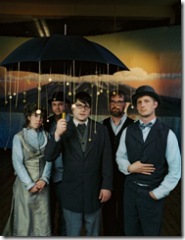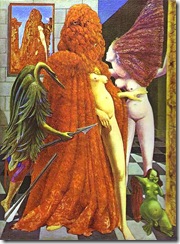
I once heard the Yiddish storyteller and Nobel Laureate Isaac Bashevis Singer describe his first experience with a cafeteria in New York City. He was initially frustrated by the lack of help he received from the servers at the strange restaurant. As he waited politely for a table, he saw scores upon scores of waiters and waitresses carrying trays of food around but they all ignored him when he requested their assistance. ‘What a devilish restaurant,’ he thought, ‘with more staff than customers, and yet the service is still horrible.’
Something similar may have gone through Colin Meloy’s mind when he and his band, The Decemberists, performed at Chastain Park this past Friday. Whereas at many venues the audience is there to listen to the performers, at Chastain the band is very much there to entertain the audience. People typically arrive half-an-hour after the show has started. They bring in their own food and spirits; they dine and converse throughout the show. The fifty or so tables set up in the area immediately before the stage reinforce this casual atmosphere, since some of the audience can even turn their backs to the band in order to better carry out their convivial discussions.
My hope is that The Decemberists were not offended by this or took it for a lack of appreciation. At a certain point Meloy even walked through the diners in the pit and sampled some brie from one of the tables. He seemed to be in a good mood, and the only reason to think otherwise is the brevity of the main set, which lasted only a little over 70 minutes. This may have been due, however, to the fact that there was no opening act and the show had to be coordinated with the Atlanta Symphony Orchestra, which performed backup on many of the songs.
The Decemberists are an Indie band (a term often used to describe something non-mainstream — I’m not sure what else it is meant to encapsulate since they are currently on a major label. They are also said to be a folk band, though I am not sure in what way, other than that in some songs an acoustic guitar predominates (for instance in Red Right Ankle, which I’m listening to, now) and that most songs involve esoteric narratives sung from the point of view of street urchins, nineteenth century soldiers and dissolute aristocrats.
My mother was a Chinese trapeze artist
In pre-war Paris
Smuggling bombs for the underground.
And she met my father
At a fete in Aix-en-Provence.
He was disguised as a Russian cadet
in the employ of the Axis.
— My Mother Was A Chinese Trapeze Artist
I don’t follow rock reviews well enough to describe the music, itself, which is beautifully melodic and filled with complex and occasionally obscure instrumentation. I think coming up with terms to describe rock sub-genres must be a bit like inventing terms to describe wines. To my palate, The Decemberists taste like summer fruit, with overtones of oak casks and tobacco, as well as a hint of wet dog. What strikes me most about the songs is the beauty of the lyrics, which typically are imbued with a nineteenth century romanticism and filled with a similarly stylized diction, as well as surprising inversions and exotic, near-hysterical rhyming schemes.
Medicating in the sun
pinched doses of laudanum
longing for the old fecundity of my homeland
Curses to this mirage!
A bottle of ancient Shiraz
a smattering of distant applause
is ringing in my poor ears
On the old left bank
my baby in a charabanc
riding up the width and length
of the Champs Elysees
If only summer rain would fall
on the houses and the boulevard
and the side walk bagatelles it’s like a dream
with the roar of cars
and the lulling of the cafe bars
the sweetly sleeping sweeping of the Seine
Lord I don’t know if I’ll ever be back again
— The Legionnaire’s Lament
The lyrics are also overflowing with words one needs to look up. What is a charabanc, or a bagatelle, or an infanta, palanquin, gingham, corncrake or taffeta? The esoteric character of the lyrics, far from making the songs remote, make them more accessible since all one has to do to enjoy them is to agree to play along. The experience is a bit like a graduate seminar in which one at first feels unqualified to participate — after a while, one realizes that no one is really qualified to participate and that all that is necessary to play is to learn a few technical terms and be willing to follow the conversation wherever it goes. As an added bonus, a conversation with The Decemberists takes you across a field of Dickensian fancies, spy novels, turn of the century adventure tales, and on occasion, in such songs as Los Angeles, I’m Yours and Sixteen Military Wives, even the contemporary world.
Finally, unlike many popular bands where memorable refrains are the most salient aspect of the songs, for me the most memorable aspect of The Decemberists are the wonderful images their songs evoke. For instance, from Los Angeles:
There is a city by the sea
A gentle company
I don’t suppose you want to
And as it tells its sorry tale
In harrowing detail
Its hollowness will haunt you
Its streets and boulevards
Orphans and oligarchs it hears
A plaintive melody
Truncated symphony
An ocean’s garbled vomit on the shore,
Los Angeles, I’m yours.
… from California One:
And the road a-winding goes
From golden gate to roaring cliff-side
And the light is softly low as our hearts Become sweetly untied
Beneath the sun of California one.
Take a long drown with me of California Wine…
… and from Summersong:
My girl, Lenin in curls
Lips parting like a flag unfurled
She’s grand, the bend of her hand
Digging deep into the sweep of the sand
Despite a forecast of summer rains, the weather was fair throughout the evening at Chastain, and as the sun set we watched bats flitting overhead. The band opened with The Crane Wife 1 & 2 and followed this with Los Angeles, I’m Yours. At the same time, my wife and I opened with some Barefoot California Chardonnay (perhaps the same wine The Decemberists sing about in California One?), accompanied by salami, butter and asiago sandwiches on homemade bread. Next we had a not-so-ancient shiraz paired with a greek salad made with rotini, cherry tomatoes, grilled chicken cubes, feta and a balsamic vinaigrette. I think The Decemberists were playing Perfect Crime #2 and The Bagman’s Gambit while we were eating our salad, but I can’t be sure. The band continued with The Infanta and We Both Go Down Together, while Mrs. Z and I continued with a double bock from Munich (we had both recently read Tim Powers’s The Drawing of the Dark in which this brew plays a central role in the survival of Western Civilization). The Atlanta Symphony Orchestra had made the earlier pieces interesting, but with the two following arrangements for Odalisque and The Tain, the audience had the opportunity to hear something transcendent. Following I Was Meant For The Stage, the ASO left the stage, as did The Decemberists.
The audience was a bit surprised at this. The sun had only just gone down. Perhaps we had done or said something wrong? Or perhaps the orchestra simply had to get home early. The crowd, previously demure and appearing uninterested, finally woke up and cheered the band to the degree it deserved for such a fine, if somewhat brief, show. The Decemberists generously came out again and performed what I think is one of their best songs, Sixteen Military Wives.
Fifteen celebrity mimes
Leaving their fifteen sordid wretched checkered lives
Will they find the solution in time
Using their fifteen pristine moderate liberal minds?
Eighteen academy chairs
Out of which only seven really even care
Doling out a garment to five
Celebrity mimes, they’re humbly taken by surprise
Cheer them on to their rivals
Cause America can; and America can’t say no
And America does, if America says it’s so,
It’s so …
A clearer expression of American exceptionalism I have never heard. The night ended with a furious and participatory rendition of The Mariner’s Revenge Song in which we had an opportunity to hear the sweetness of Jenny Conlee’s singing as she stepped out from behind the organ to strap on an accordion.
The Decemberists departed the stage for the second time that evening and as the audience began chanting, once again, for more, the stage hands were abruptly sent out to send a clear message that the evening was over. It reminded me of something my grandfather used to say when guests had overstayed their welcome. “Come on, honey. We ought to go to bed. These people obviously want to go home.”
You can hear some of The Decemberists at their myspace site here. In addition, they did a recording for Austin City Limits a few days ago, which should air fairly soon.








